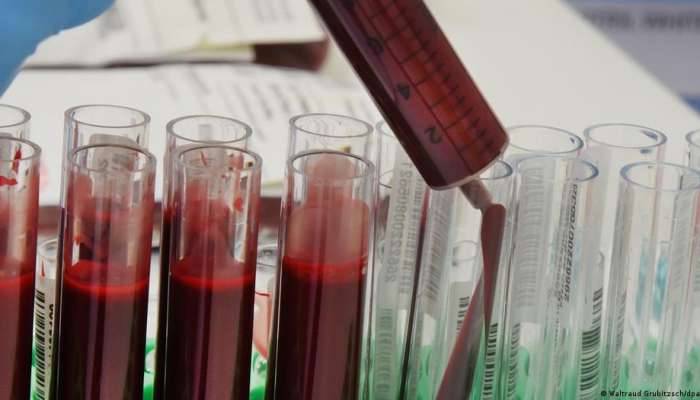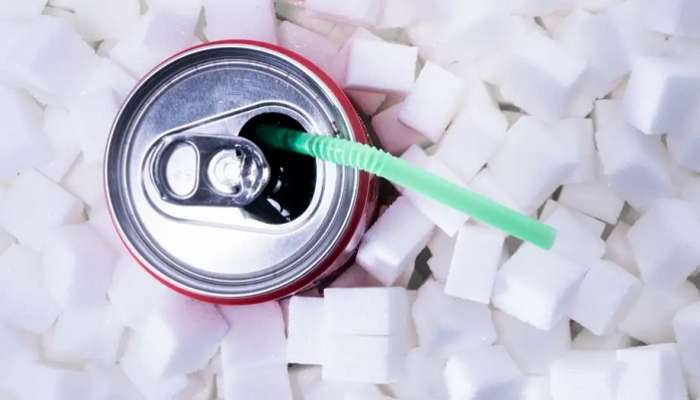

Go to any supermarket or convenience store and you will find jams, sodas and other sweet snacks advertising that they're "sugar-free".
Sugar-free is one of the most common terms in food industry marketing. Household sugar used to be the king of flavor carriers, but these days it's got to be sugar-free.
If you take a close look at the ingredients on sugar-free sodas, for instance, you'll notice that sugar isn't even listed. Instead, there are various artificial sweeteners, like E950, E951 or E954.
Those E-Numbers are codes for synthetically produced compounds, such as acesulfame potassium, aspartame and sucralose.
Artificial sweeteners up to 500 times sweeter than sugar
Artificial sweeteners are food additives and their popularity is easy to explain.
They are practically calorie-free, so they could be good to help people tackle overweight and obesity.
Plus, they are many times sweeter than household sugar. That means you only need a few milligrams to sweeten foods.
Aspartame, for example, is 200 times sweeter than household sugar, and sucralose is 500 times sweeter. This allows people to enjoy low-calorie cakes, sodas and sweets without a guilty conscience, or so the food industry promises.
Are aspartame and cyclamate carcinogenic?
The scientific community, however, has taken a more critical view of sweeteners. One persistent concern is that sweeteners are carcinogenic.
In July 2023, the International Agency for Research on Cancer (IARC), which is part of the World Health Organization, classified the sweetener aspartame as "possibly carcinogenic." But the IARC said the scientific evidence for this assessment remains weak.
This follows studies, including one that involved rats. The animals were fed a high dose of cyclamate, and some of them developed bladder cancer as a result.
The same results have not been seen in humans, however, possibly because sweeteners are not usually consumed in such large quantities as they were in the experiment.
Warnings about the "possible" risks of sweeteners
Stefan Kabisch, a researcher at the Department of Endocrinology and Metabolic Medicine at the Charite Hospital in Berlin, has said trials, tests and studies on cells in animals and humans indicate that artificial sweeteners could indeed be carcinogenic. Warnings about the potential risks are good, he added.
"The classification of aspartame as 'possibly carcinogenic' is unlikely to change our daily consumption. It was a reserved classification, which means a cancer risk is by no means certain and not even particularly likely," said Kabisch.
For this reason, the previously recommended daily consumption of up to 40 milligrams of aspartame per kilogram of body weight remains in effect.
That means that an adult weighing 70 kilograms (154 pounds) would have to consume between nine and 14 cans of diet soft drinks per day to exceed that amount.
Too few studies on too few sweeteners
Another concern is that sweeteners have a negative effect on intestinal flora, the microorganisms that occur naturally in our digestive tract.
A 2014 experiment conducted on mice by Israeli researchers showed that the animals had disturbed intestinal flora and problems with glucose metabolism after regular consumption of saccharin and sucralose.
"I consider a change in the intestinal flora due to sweetener consumption to be quite probable, since the sweetness receptors in the intestines can be influenced by sweeteners," said Kabisch. But he added that the research was still too inconclusive to make a definitive judgment.
Kabisch said that was a basic problem with a lot of studies into artificial sweeteners.
"Often, only two or three sweeteners are tested, but there are so many sweeteners with different chemical structures that we can't generalize about the conclusions," he said.
To acquire truly meaningful results, said Kabisch, it would be good to conduct each experiment on all of the sweeteners approved in the European Union.
Artificial sweeteners trick the brain
Kabisch, a trained physician, sees another potential risk from sweeteners: it could adversely affect the perception of taste in children.
In those early years of development, the brain has to learn how to associate sweetness with high-calorie, sweet foods.
"Sweeteners trigger a dissonance in the brain. The sensation of pleasure from the sweet taste occurs, but the calories are missing and so the feeling of hunger comes back more quickly," said Kabisch.
Other researchers, such as the diabetologist Achim Peters, are also concerned about this effect. Through his research, Peters has found that sweeteners fool the brain and pose a risk to a healthy metabolism.
For example, if you eat an artificially sweetened muffin, you send a signal to the brain and body that high-calorie food is on its way. But when that sugar, which the brain and body need, doesn't arrive, the brain may lose its ability to assess whether it's about to receive an energy supply or not. This uncertainty can cause a physiological reaction, which may results in excessive food intake.
There's also the psychological issue of addiction: a French study on rats demonstrated that sweeteners can be just as addictive as regular sugar. They can even be more addictive than recreational drugs, like cocaine.
Are artificial sweeteners worse than sugar?
Despite the new information, Kabisch doesn't recommend switching from artificial sweeteners back to household sugar.
"For sugar, the evidence is much clearer that it promotes obesity, Type 2 diabetes and tooth decay. It definitely increases the risk of getting cancer," he said.
There is no significant reason, said Kabisch, to actively avoid sweeteners, but also no reason to actively recommend them either.